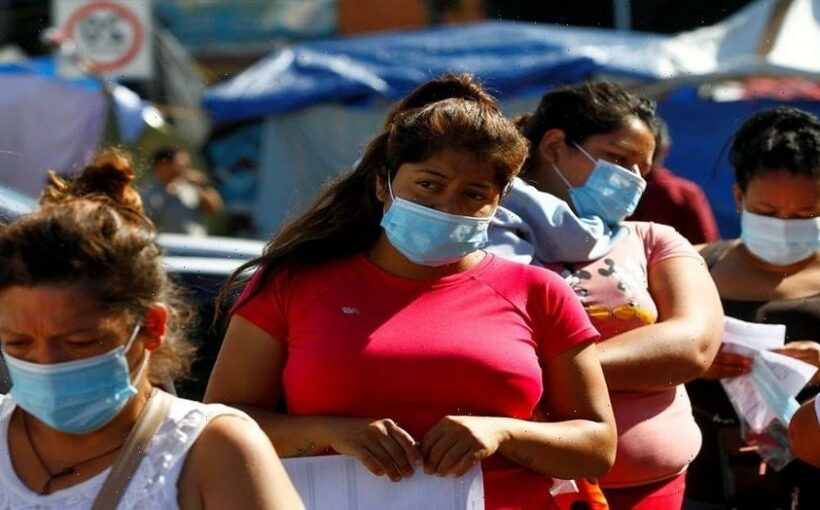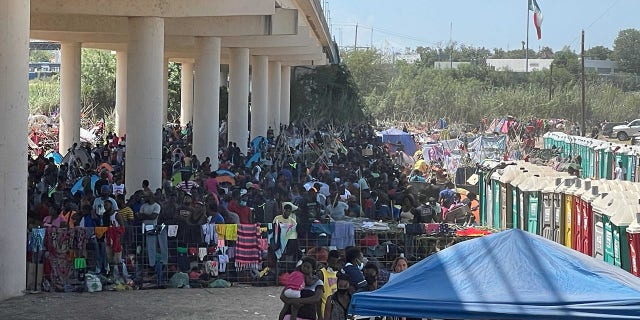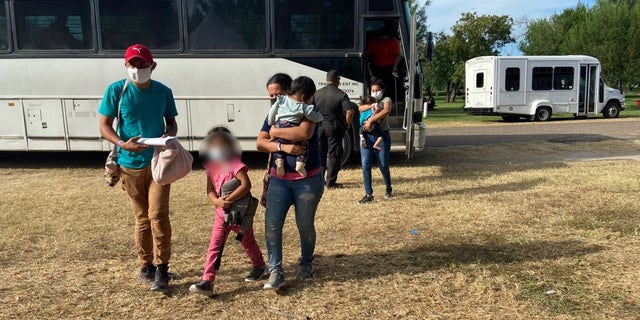US taxpayers funding migrant food, legal expenses
National correspondent William La Jeunesse has the details from La Joya, Texas, on ‘Americas Newsroom.’
McAllen, Texas – For many migrants, McAllen, Texas, is the end of a journey. For others, it’s the beginning of a new one. Some will live in the U.S. legally, most will not, as 63% of asylum claims are denied, many abscond immediately and a majority ignore their final order of removal.
Five years after crossing the border, according to the 2020 DHS Lifecycle Report, just 8% of migrants received approval to remain in the U.S.
Getting to the border is half the battle, getting a foothold here is another. Playing a vital role in that transition are hundreds of NGOs, or non-governmental organizations receiving at least $137 million in federal grants, according to federal budget figures. Grants pay for everything from food, shelter, and transportation to legal services that help the migrants traverse Mexico. Some border agents feel U.S. taxpayers unknowingly help migrants enter illegally.
“Do you think they (NGOs) are working at cross purposes to you?” I asked Chris Cabrera, chief of the National Border Patrol Council in South Texas.
“Most definitely,” Cabrera said. “And they should not be allowed to, but our government allows it. And that’s a problem. And it’s one reason morale is so low.”
Once across the border, a network of NGOs helps migrants reach their final destination, unaware if the individual will follow the law or break it. Border Perspective’s Yonathan Moya, a young pastor who grew up in McAllen, Texas, says it is hard.
“For us as people of faith we just have to be able to respond. If there’s suffering. If there’s hunger. It’s just what we do,” he said. “People who are doing the hard work to really alleviate suffering are not seeing any of those federal dollars. We’re doing this because it’s about compassion. It’s about empathy. It’s about love for our neighbor.”
Moya took us to a migrant camp in Reynosa, Mexico, where thousands waited to cross the border. In freezing temperatures, groups of migrants burned construction material and garbage to say warm under plastic tents or tarps. Church groups bring food to help them survive. No one looks rich, despite the smuggling fees paid or assets pledged to cartels.
“All he is trying to do is fight for his and his sons’ life,” Moya said, interpreting for a young man from El Salvador. “It is a great risk trying to migrate to the United States. It was one of his only options.”
Speaking for a young woman from Honduras, Mora said, “Her goal is to provide for her kids and work hopefully. She will wait as long as it takes to get here.”
Most Central Americans traveling to south Texas come by truck, bus and taxi. Many are stopped by Mexican police who demand to see a 90-day visa issued by Mexican immigration allows them to travel north to the U.S. Obtaining the visa can be confusing, lengthy and difficult. To help, the United Nations High Commission on Refugees has set up offices en route in cities like Tapachula on the Guatemalan border.
“I have been watching the United Nations, UNHCR distribute cash debit cards to migrants. They’re providing food, basic necessities, prescription drugs. They call it movement assistance, which is to say they’re providing, transportation money so that migrants can continue moving forward,” said Todd Bensman, who recently traveled to the Mexican-Guatemalan border for the Washington DC-based Center for Immigration Studies, a right-leaning think tank.
Sept. 18, 2021: Migrants camp under the International Bridge in Del Rio.
Bensman believes the UN and several U.S. NGOs effectively underwrite the migrant pipeline, funneling thousands of individuals without skills or proper papers into U.S. cities using U.S. taxpayer dollars, undermining border security and overwhelming agents with unaccompanied children while cartels import drugs nearby.
“The only thing that’s really, obviously problematic about these migrant advocacy groups, these nonprofits – they’re out there lobbying for money, for the migrants and for policies that increase the number of migrants,” he said. “So when you say ‘We’re doing this out of the goodness of our hearts and all in the service of the Lord.’ It’s also in the service of their bottom lines.“
Danilo Zak, with the advocacy organization National Immigration Forum, doesn’t see it that way.
“There’s a lot of work that needs to be done to process migrants who are arriving, to care for unaccompanied children, to provide COVID tests and vaccinations,” said Danilo. “Shelter organizers, mostly groups of faith, mostly based in churches, really help the government shelter the most vulnerable migrants.”
Zak says the federal government has chosen to effectively farm out many of its legal responsibilities to nonprofits, not just because it can make financial sense to be flexible but because there are jobs better suited to social workers than border agents.
Migrants arrive to the COVID-19 quarantine camp and testing center at Anzalduas Park in Mission, Texas. (Ashley Soriano/Fox News)
“It used to be the vast majority of migrants were single adults and they came for economic opportunity.
“Now we have a lot of these vulnerable families and unaccompanied children that can’t be put in detention. The local community, especially groups of faith, have really helped respond to that need.”
Neither side feels it is wrong. The Border Patrol is charged by Congress to secure the border to the letter and spirit of the law. Loopholes, policies, and underhanded organizations try to defeat them. Sadly US taxpayers are caught in the middle – paying for some things that undermine America’s core values.
Source: Read Full Article





